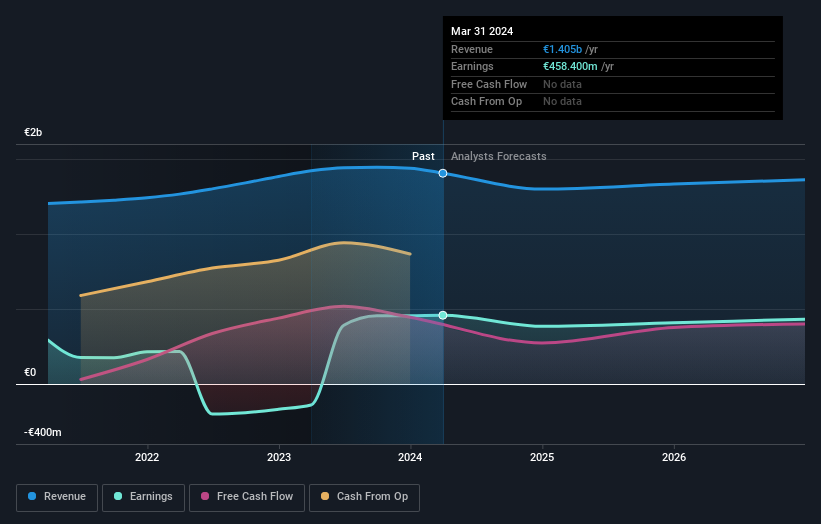Private equity firms account for 48% of Koninklijke Vopak N.V.'s (AMS:VPK) ownership, while individual investors account for 28%
Key Insights
The considerable ownership by private equity firms in Koninklijke Vopak indicates that they collectively have a greater say in management and business strategy
A total of 2 investors have a majority stake in the company with 51% ownership
Every investor in Koninklijke Vopak N.V. (AMS:VPK) should be aware of the most powerful shareholder groups. And the group that holds the biggest piece of the pie are private equity firms with 48% ownership. In other words, the group stands to gain the most (or lose the most) from their investment into the company.
Meanwhile, individual investors make up 28% of the company’s shareholders.
Let's take a closer look to see what the different types of shareholders can tell us about Koninklijke Vopak.
Check out our latest analysis for Koninklijke Vopak
What Does The Institutional Ownership Tell Us About Koninklijke Vopak?
Institutions typically measure themselves against a benchmark when reporting to their own investors, so they often become more enthusiastic about a stock once it's included in a major index. We would expect most companies to have some institutions on the register, especially if they are growing.
As you can see, institutional investors have a fair amount of stake in Koninklijke Vopak. This suggests some credibility amongst professional investors. But we can't rely on that fact alone since institutions make bad investments sometimes, just like everyone does. When multiple institutions own a stock, there's always a risk that they are in a 'crowded trade'. When such a trade goes wrong, multiple parties may compete to sell stock fast. This risk is higher in a company without a history of growth. You can see Koninklijke Vopak's historic earnings and revenue below, but keep in mind there's always more to the story.
We note that hedge funds don't have a meaningful investment in Koninklijke Vopak. HAL Investments B.V. is currently the company's largest shareholder with 48% of shares outstanding. The second and third largest shareholders are Sprucegrove Investment Management Ltd and Maple-Brown Abbott, with an equal amount of shares to their name at 3.0%.
After doing some more digging, we found that the top 2 shareholders collectively control more than half of the company's shares, implying that they have considerable power to influence the company's decisions.
Researching institutional ownership is a good way to gauge and filter a stock's expected performance. The same can be achieved by studying analyst sentiments. There are plenty of analysts covering the stock, so it might be worth seeing what they are forecasting, too.
Insider Ownership Of Koninklijke Vopak
While the precise definition of an insider can be subjective, almost everyone considers board members to be insiders. Management ultimately answers to the board. However, it is not uncommon for managers to be executive board members, especially if they are a founder or the CEO.
Most consider insider ownership a positive because it can indicate the board is well aligned with other shareholders. However, on some occasions too much power is concentrated within this group.
Shareholders would probably be interested to learn that insiders own shares in Koninklijke Vopak N.V.. The insiders have a meaningful stake worth €145m. Most would see this as a real positive. Most would say this shows alignment of interests between shareholders and the board. Still, it might be worth checking if those insiders have been selling.
General Public Ownership
The general public, who are usually individual investors, hold a 28% stake in Koninklijke Vopak. This size of ownership, while considerable, may not be enough to change company policy if the decision is not in sync with other large shareholders.
Private Equity Ownership
With a stake of 48%, private equity firms could influence the Koninklijke Vopak board. Sometimes we see private equity stick around for the long term, but generally speaking they have a shorter investment horizon and -- as the name suggests -- don't invest in public companies much. After some time they may look to sell and redeploy capital elsewhere.
Next Steps:
While it is well worth considering the different groups that own a company, there are other factors that are even more important. Consider for instance, the ever-present spectre of investment risk. We've identified 2 warning signs with Koninklijke Vopak (at least 1 which shouldn't be ignored) , and understanding them should be part of your investment process.
If you would prefer discover what analysts are predicting in terms of future growth, do not miss this free report on analyst forecasts.
NB: Figures in this article are calculated using data from the last twelve months, which refer to the 12-month period ending on the last date of the month the financial statement is dated. This may not be consistent with full year annual report figures.
Have feedback on this article? Concerned about the content? Get in touch with us directly. Alternatively, email editorial-team (at) simplywallst.com.
This article by Simply Wall St is general in nature. We provide commentary based on historical data and analyst forecasts only using an unbiased methodology and our articles are not intended to be financial advice. It does not constitute a recommendation to buy or sell any stock, and does not take account of your objectives, or your financial situation. We aim to bring you long-term focused analysis driven by fundamental data. Note that our analysis may not factor in the latest price-sensitive company announcements or qualitative material. Simply Wall St has no position in any stocks mentioned.

 Yahoo Finance
Yahoo Finance 

